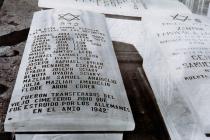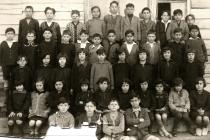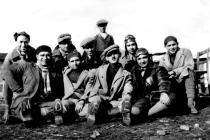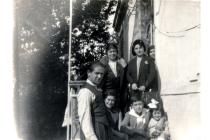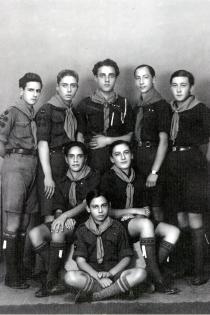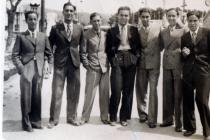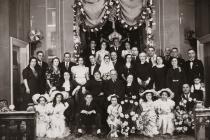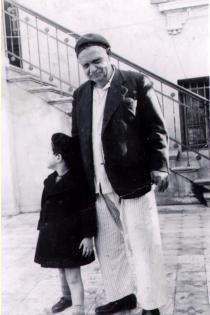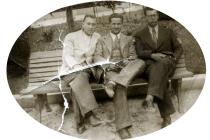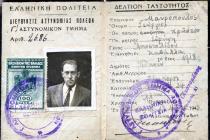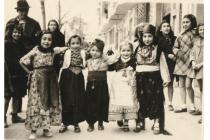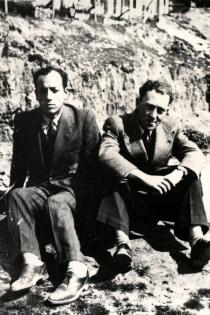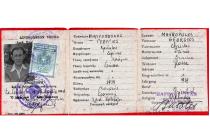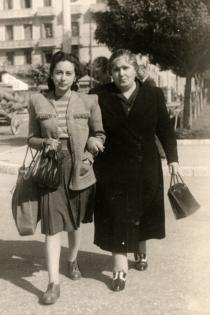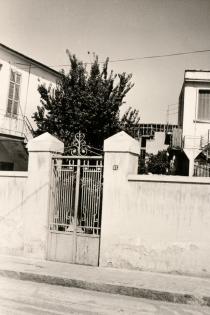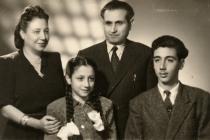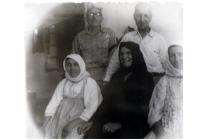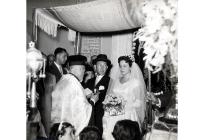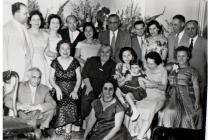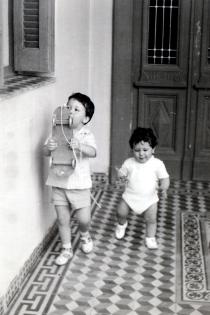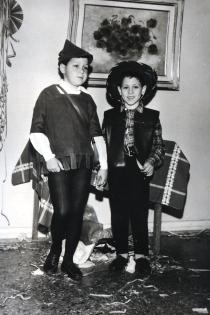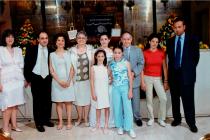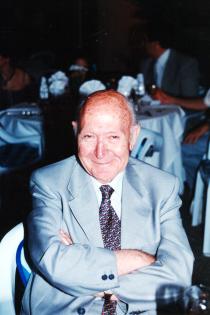
Maurice Leon
Athens
Greece
Interviewer: Nina Hatzi
Date of interview: May 2007
Mr. Maurice Leon, 89 years old, lives with his beloved wife Yvette in a small apartment in the suburbs of Athens. Entering the apartment one can fell the warmth of its inhabitants. Everywhere around the house one can see photographs, reminders of the life they had in Thessaloniki and later on in Athens, where they have lived for the last 50 years. One can also see the photographs of his children and grandchildren, who he adores. Having lived all his childhood and youth years in Thessaloniki, Mr. Leon is full of memories of how this town used to be before World War II. He was eager to share these memories along with his worries about the future of Judaism.
My family history
Growing up
Going to school
During the War
After the War
Glossary
My name is Maurice Leon. I was born in Thessaloniki on 27th September 1918.
Similarly to all Jews of Salonica 1 my ancestors' origins were from Spain. I believe that they came to Salonica in 1492. On my father's side, our ancestors came from Leon district [a province of northwestern Spain] and this is the reason our last name is Leon. When I was a child my father Isaac told me that our ancestors first went to Smyrna [today Izmir, Turkey] and then came to Salonica.
My father's father was called Juda and his mother Rahel. Grandfather Juda was involved in commerce. I remember him going back and forth to the city of Yiannitsa. [Giannitsa (or Yiannitsa): a town in Greece's Pella Prefecture, the largest city in the 'Macedonian Plains' region, chiefly an agricultural center.] My father told us the following story about our grandfather Juda: Once Grandfather Juda was coming from Yiannitsa back to Salonica with his horse. But he was late and found the gate of the fortress of Salonica closed. So he stayed out for the night. He was caught by thieves that wanted the sachet with his money. But he managed to hide it so well that the thieves couldn't find it. So he was able to save the earnings of that day. Later on, my grandfather Juda started a soap factory 2 in Salonica. His children continued this business after him. The factory was finally closed a few years after World War II. I don't know when Grandfather Juda died.
My mother Riketa's origins were also from Spain. My mother's mother was called Benuta. Grandmother Benuta was the sister of my father's first wife, Jamila. My mother's father was called Ovadia Sciaky. I don't know anything else about Grandmother Benuta and Grandfather Ovadia.
My father's name was Isaac Leon. He was born around 1870 and died in 1949. My father's brothers were Jomtov and Samuel and his sisters were Sara, Lea and Benvenida.
My father was very authoritarian. When we sat at the table nobody was allowed to talk. And if somebody was talking a lot, my father would tell him or her to leave the table and go sit in the kitchen.
My father Isaac was married twice. His first wife's name was Jamila Sason. One interesting detail of that period of time was that my father's second wife Riketa, my mother, was the niece of his first wife Jamila. So my mother was first cousins with my father's and his first wife Jamila's children. His second wife was my mother Riketa, nee Sciaky. My mother was born around 1900 and died in 1970.
My mother Riketa was like all mothers. She loved her children very much. She was kind and never got angry. She had a very kind character. My mother didn't wear traditional clothes. She was dressed according to the fashion of the time. But she would always wear a hat on formal occasions.
I also remember my mother's sister Flor Pinchas, nee Sciaky, and her daughter, our cousin, Rahel Pinchas. My aunt Flor went to live in Israel before World War II. She was the one that saved all our family photographs.
We were a very big family. We were seven siblings. The first four were my father's first wife Jamila's children. The last three were my father's second wife Riketa's children. Although there was a significant age difference between Riketa's and Jamila's children, all siblings had a very close relationship.
The eldest was my sister Rahel. She was around 15 to 20 years older than me. She was married to our cousin Alberto Leon, son of my father's brother Samuel Leon. Thus my sister Rahel was called Leon before and after she married. My mother told me that when my sister Rahel got married my youngest sister Berta was about to be born. And something very characteristic was that later on my mother Riketa and my sister Rahel were breastfeeding together! I don't remember my eldest sister Rahel at home, before her marriage. Neither do I remember her wedding. But I remember she was living very close by and we were always together.
I remember also Rahel's children, my cousins Samuel-Sam Leon and Niko Leon, who was born unhealthy. Sam Leon was born around 1924 and lives in Thessaloniki. Niko Leon died in Switzerland a while after World War II.
After Rahel, in 1905 I suppose, my brother Juda was born. Juda was married to Victoria, nee Molho, and had two children, Niko and Nina. After Juda came Jacque Leon. He was born around 1910. And the last of my father's first wife Jamila's children was Sara. Sara was born in 1912. I remember her wedding in 1936 very well. Sara was married to Sam Amarilio. They chose to have their wedding at Matanot Laevionim 3. It was a welfare institution and had a synagogue, too. Their marriage was very aristocratic.
After Sara, Zan was born in 1916. She was the first of my father's second wife Riketa's children. Zan was married to Eli Cohen and had two children, Helen and Harry. They went to Montreal in Canada. I was born after Zan and last was Berta Matathias, nee Leon, born in 1926.
We had the soap factory that my grandfather had started. We were producing green soap and sold it to all merchandisers in Thessaloniki. The factory was at 30 Prometheus Street. We had fifteen people working for us. Most of them were men but we had two or three women, too. In the meantime my father had started a business in Skopje and he was going there very often. He was partner in a soap factory there. I still remember the name of that company. It was called Tasha Staits and Company. They were Serbians and were producing the same soap as ours in Thessaloniki.
At our factory in Thessaloniki, apart from my father, were also working my brother Juda and my cousin Alberto Leon, who was married to my eldest sister Rahel. I didn't work there before the war. I was too young.
In 1935 we became associates with Vasilis Giakos who had a soap factory, too. We decided this in order to expand our business. Together with Mr. Giakos we formed a company named Leon & Giakos, thus having the monopoly of soap production. We were in business together until 1957 when we shut down the soap factory.
I remember well the house I grew up in. At first we had a house on Kleanthous Street in Thessaloniki. Later on we moved to another house on Italias Street. I was twelve years old when we left the house on Kleanthous Street. I remember it had a big yard, many rooms, and a cellar, where they had a big barrel with 'alisiva' [or aleshiva: detergent made with ashes mixed with water] that was used for washing the clothes. We had both water and electricity in our house. I remember that my bedroom was very small, but I was sleeping alone. The rest of my siblings were sleeping by two in each bedroom. In the garden were many trees, flowers and a well.
Our neighborhood was Jewish. I don't remember the names of our neighbors. There were also some houses that Christians lived in but the majority was Jewish homes.
We left the house on Kleanthous Street and moved to another on Italias Street because it was bigger and more convenient. Our second house was a big corner house. It doesn't exist any more. A few years ago I went to look for it, but they've put an apartment building in its place.
I remember this house very clearly. It had a well in the yard. It had a big entrance hall. There was a big corridor. On the right there were three bedrooms. All my siblings had their own bedroom, apart from my sisters who were sharing bedrooms by two. At the end there was a very small room. On the left was the dining room. There was also the kitchen with a place where we would put the coals and the ice box. There was a wandering merchant selling big blocks of ice. We would buy ice from him and put it in the ice box in order to preserve the food.
We knew all our neighbors in this neighborhood. They were all Jews and we had very good relationships. I remember that near our house was the Krispi's bakery where we would buy our bread. Also living in this neighborhood was a family called Petsa and a lady called Mrs. Makri. We were very good neighbors with them, too.
As children we would play together with the children living in our neighborhood. There was a big yard near a Romanian school where Romanian children were studying. In this yard we used to play football.
We had people helping with the housework. There was a woman from Aivat. [Editor's note: Aivat is a poor village in the mountains surrounding Thessaloniki. Many housemaids came from there. Now it is called Diavata.] Her name was Paraskevi and she was staying with us until World War II. My mother was also calling periodically another woman for the laundry.
My mother usually didn't do the shopping. The shopping was done by my father. He would buy from the market and send them to the house with a 'chamalis' [Turkish: hamal: folk expression for delivery service]. There were also the 'bakalika' [Greek: small general food stores] of our neighborhood were we could do the shopping. We didn't buy kosher meat.
At home we were talking Judeo-Spanish, Ladino 4, as we were growing up. Jewish life in Thessaloniki was very vivid, both religiously and socially. In our house we didn't observe the Sabbath fanatically. But the Jewish holidays were very meticulously celebrated in our house.
There were many preparations done at home for Pesach. Most of them were done by the women of the house. I remember they wouldn't leave even a tiny piece of bread inside the house. They were checking everywhere. The women of the house prepared food according to pascoual 5 dietary laws. They wouldn't allow any food that wasn't permitted for Pesach.
Usually we wouldn't go to the synagogue on Pesach. The first night the whole family would sit around the dinner table. We read the Haggadah in Ladino. First my father was reading and then the children in turns. It was something wonderful how many we were gathered around the Pesach table. We were more than twenty. And if there were people, even strangers passing by, we would invite them in, too.
I remember something very characteristic about Pesach. I was around twelve years old and by that time we were living on Italias Street. It was the first night of Pesach. I was late for Pesach dinner that night. As I was walking from the bus station to our house I could hear from the open windows of the houses I was passing the recitation of the Haggadah. All Jewish homes had their windows wide open and the reading of the Haggadah could be heard out in the street.
I also remember the matzot that we ate. We would buy it from the Jewish Community of Thessaloniki. We had a big wooden box and we placed the matzah we bought there. It was in big pieces. We were eager to eat it. But the food that I liked best on Pesach was 'massa en caldo' [Ladino for: matzah in gravy soup or boullion], something like a soup made with matzah.
On [Yom] Kippur we were fasting. We would eat very early in the afternoon and wish each other a good Kippur. That was all. What I remember very distinctively about Kippur, is that very early in the morning someone was passing by yelling: 'Que se alevanta selihot' - Who will wake up early in the morning to go to the synagogue? [Editor's note: The custom of waking up early in the pre morning hours to recite Selihot during the 40 days from Rosh Hodesh Elul until Yom Kippur is codified in Shulhan Aruch (Orah Hayim 581; 1). The Selihot prayers were designed to facilitate Teshubah (repentance) in preparation for the annual Day of Judgement. (Source: http://www.judaic.org/halakhot/selihot.htm)] Kippur was the day that we did nothing else but go to the synagogue. I went to the synagogue with my father. My brothers wouldn't come. They were not so fanatic about it.
Near our house there was a synagogue called Beit Saul Synagogue 6, which doesn't exist any more. It was destroyed. Beit Saul was astonishing. It was very big. On Kippur it was full of people. There were even people standing outside. At night we would return from the synagogue and eat again all together at home.
On Sukkot we would built a sukkah. My father was preparing it. He set it up on the terrace of our house and we would cover it with canes.
The first school I went to was Alchech School 7. It was a Jewish school. I remember to the same school went: Toto Beniech, Souhami, Amar, Bueno, Saragoussi, Elie Cohen, Elie Aleion, Acher, the Cohen sisters, Barzilai, Nina Uziel, Joseph Nissim and Salomon Molho. It was an old building on Ermondou Rostand Street, if I remember well. We had very good teachers. We had someone called Leitmer, who was teaching Mathematics, and Polichronopoulos, who was teaching Greek. The lessons were taught in Greek and French. We celebrated all Jewish holidays at school. We were also taught Hebrew and Jewish religion by someone called Stroumsa. My favorite lessons were History and Greek. The professor I liked most was the mathematician, Mr. Leitmer. He was from Belgium. He was teaching maths in French. He was very good.
After I graduated from Alchech School, I went to the French Lycèe. It was a French school but the majority of the students were Jews. The lessons were taught in French. This school was not religious. It was Mission Laïque 8. We didn't study Jewish religion and Hebrew there and we didn't say morning prayers. On Jewish holidays we would go to school except on Kippur. On Pesach many Jewish students were absent, but we would go.
I remember that the last director of this school was not so fond of Jews. But usually the teachers were very good. I remember one of those that were good was called Mr. Groleau. He was very easy-going and helpful to the students.
I remember that in Thessaloniki there was a vivid religious and social Jewish life. There was Maccabi 9. It was a club were Jewish children were gathered. It had a very good library, too. We would have scouts meetings, went on excursions, played ball games and things like that. I started going there at the age of ten. And although in the meantime we changed houses, I still continued going to Maccabi. Our house on Italias Street was not very far from our old house.
The Zionist 10 issue was very developed there. We had meetings where they were talking to us about Zionism and Palestine. As Maccabi group we took part at the National Parades on Greek National Holidays such as 25th March 11 and the rest. We would wear our scouts uniform which included a green color neckerchief and the various Maccabi scouts emblems.
These scouts meeting were something very strong in our childhood years. We would go on excursions to Chortiatis [a mountain area in the Thessaloniki Prefecture, Greece, consisting of the villages of Asvestohori, Exochi, Chortiatis and Filyro]. There we would go for walks in the forest. We went on excursions to the School of Agriculture 12 and to the sea for swimming.
Our team leader would urge us to get involved in the various activities organized. We would gather approximately 30 children. I remember Salomon Molho, Fiko Nissim, Joseph Nissim, Elie Sciaky, Elie Cohen, Tory Beza, Harry Perez, and Marsel Natzari who all came to Maccabi. I also remember our leader Saragoussi.
We could also find very interesting books at the Maccabi library. I served as a librarian for a period of time there. I liked reading very much. Back then we didn't have television and things like that.
There was another Jewish scout organization called Hakoah 13, but we were not involved with it. They did the same activities as we did. But Maccabi was much more popular. All the Jewish scout organizations were under the auspices of The Greek Union of Scouts and not under the Jewish Community of Thessaloniki. I don't remember the Jewish Community of Thessaloniki organizing events for children.
Thessaloniki was a beautiful city. We could go swimming and on excursions. Generally we had a good life there.
There were many Jews in Thessaloniki. The neighborhood that I lived in was a Jewish neighborhood. There were many synagogues 14. I usually attended the Beit Saul Synagogue. I had my bar mitzvah there, too. I remember the parasha [weekly Torah portion] I read, starting with the words 'Asher ve asher...' Rabbi Stroumsa was my tutor. There was another synagogue called Chai Yiako Smoel. My father went there. It was on Miaouli Street, very close to our house.
In Thessaloniki there was also a Jewish Cemetery 15. It was destroyed. Nothing was left of it. It must have been very big, considering the number of Jews that lived in Thessaloniki. It used to be where the university stands today.
There were also various clubs in Thessaloniki. I remember a club called Ajiji [AJJ] 16. We would gather there for lectures, excursions and flirting. It also had a library. At Ajiji club we would celebrate the various Jewish holidays, singing and dancing. I remember on Chanukkah we lit the candles and sang Chanukkah songs. Each day we would light an extra candle. Then there was a special treat, a sweet called 'tajicos de menta' 17.
There was also the Club of the Graduates of the French School.
Various Jewish newspapers were published in Thessaloniki. In our house we usually read Le Progrès 18. I remember very distinctly an anti-Semitic incident that happened before World War II. The Jewish neighborhood of Campbell was set on fire 19. All the newspapers were writing about it with big headlines on the front page.
There was an anti-Semitic organization called the 3E 20. When we were asking what 3E meant we were told that it meant 'Greeks Exterminate the Jews' 21. This organization was similar to the organizations that existed in Germany at that time.
After the Campbell Fire we would see the Swastika painted on the walls of various houses. We were very afraid. Many Jews left Thessaloniki after this incident and went to live in Israel, back then Palestine. There was uneasiness among the Jewish population. But there were many Greeks who stood on our side and comforted us.
I didn't have the chance to study after graduating from high school. I went directly to do my military service. I went to the army in 1939. Soon after that the war was declared. I fought in Albania 22 until Greece was defeated. By the time I came back, Greece was occupied.
I did my military duty at the Third Division of the Greek Army. There were many Jews there. Before the war we often did night patrols. I remember that there was someone who was singing Judeo-Spanish songs, while we were walking at nighttime, to keep us awake. There were two Spanish singers, Oumanouno and Navaro, who were very popular at that time. And this one guy was singing some of their songs, but which I can no longer remember.
My military service lasted approximately two years. I remember anti-Semitic incidents in the army. There was a high ranking army officer who was often saying: 'Hitler take a 24 hour break and come to Greece to exterminate the Jews.' We felt insulted but there was nothing we could do about it. This incident happened before Greece was involved in the war.
After I did the preliminary military service, I was sent to the army bakery. It was office work most of the time. I was working there when the war was declared. One morning, as I was going to do my duty, I heard the newspaper salesman yelling that Greece was at war with Italy. We were listening to the news on the radio and reading the newspapers to learn more. People were very patriotically enthusiastic at first.
Soon after, I was sent to the front line. In 1940 I was sent to the central battle frontier at Korytsa. [Korytsa: city in northern Albania with a concentration of Greek population. It was occupied by the Greek army on 22nd November 1940.] I was there for six months. There were many Jews that died during the Albanian War. I remember one of them, Arditis was his name. At night we were sleeping in tents. We could hear the bombs that the Italians were dropping. I remember one night a fellow soldier went out to change shifts with another that was on duty just outside our tent. A while later we went out. A missile had wounded him on the head, we found him dead.
During the period we were at the front line we were writing letters to our relatives. There was no telephone there. I was writing that I was okay and not to worry. Usually it was my siblings that were writing back to me. Our correspondence was in Greek.
As we were marching, Italians were retreating. We caught Italian soldiers and took them as prisoners of war to Giannena. [Giannena or Ioannina: main city in Epirus, northwestern Greece; the capital of Ioannina Prefecture and of Epirus.] We would then guard them in shifts. I was in Giannena when the war ended 23. From Giannena I went to Athens by foot. While walking, we could see the German air force bombarding.
One week later we finally arrived in Athens which was occupied by Germans. There I met my brother Jacque and our fellow business partner Grigoris Giakos. We were trying to find a way to return to Thessaloniki. Our families, our relatives were expecting us there. In order to calm their anxiety we had a photograph taken and sent it to them. My brother Jacque was sitting in the middle, Giakos at his right and I was sitting at my brother's left side. I had my hand behind his shoulder. When our relatives in Thessaloniki saw this photograph, they were very worried. My mother was wondering where my hand was. They thought that I had lost my hand because during the war my hand was paralyzed and this was the reason that I was sent to Giannena.
We stayed in Athens for one week. We were free of our military uniforms by now. We had bought new clothes. Things were easygoing in Athens, which was still under German occupation. Finally we found a bus that could take us back to Thessaloniki. It wasn't easy. Many people wanted to leave Athens. But I had money with me and I managed to arrange things for us. While at war, we regularly received money checks from our families. Just before the end of the war I had received a money check and that's how I ended up with money in Athens.
Finally we arrived in Thessaloniki. We went straight to our house. We all gathered there. Life was easygoing at first. We continued our business, the soap factory. Soap was in demand at that time. It had disappeared because there were no factories producing it any more. There was scarcity of food also. We exchanged soap for flour and other products. Money had lost its value.
We had not yet understood what the German occupation was all about. They were not hurting the Jews yet. Until the day Germans decided to gather all Jews of Thessaloniki at Eleutherias Square 24. And almost all Jews went there. I went, too. But when I saw the torturing under the sun, I said to myself that I wasn't going to stay any longer. At a moment that neither the Germans nor the Greek policemen were watching me, I stepped out of the line and ran towards a small alley and disappeared. As I learned later on, many were set free that day but they were called back again and were sent to forced labor camps 25.
Meanwhile my brother Jacque went to the cemetery and unburied all our ancestors. The Germans had ordered the destruction of the Jewish Cemetery of Thessaloniki. The graves were destroyed. We didn't want to leave our ancestors' bones out there. So my brother went to the cemetery and unburied all of them one by one. Each one was placed in a pouch with their nametags on it. We kept them in our factory.
Later on, when we went into hiding, some people came and occupied our factory. They threw all the bones aside in order to steal the pouches. When we came back from hiding we had no other choice but to place all the bones in one grave with all the names written on it at the New Jewish Cemetery in Thessaloniki. On the grave is written: 'Fueron transerados del viejo cimeterio jidio que fue estruido por los allemanes en el anio 1942' [They were transferred from the Old Cemetery that was destroyed by Germans in year 1942], followed by the names of our relatives: Samuel Juda Leon 5003, Juda Samuel Leon 5057, Avram Samuel Leon, Rahel Juda Leon, Samuel Juda Leon, Jomtov Juda Leon, Moise Jomtov Leon, Raphael Samuel Leon, Jamila Isaac Leon, Joseph Raphael Avram, Bea Menahem Eskenazi, Ovadia Joseph Sciaky, Benuta Ovadia Sciaky, Mazliah Samuel Amariclio, Julia Mazliah Amariclio, Flor Aron Cohen.
After the destruction of the cemetery, the Germans ordered all Jewish shops to have a sign stating that they were Jewish shops, and each Jewish house to have a Magen David 26. We had to wear a yellow star. Later on deportations to Poland started 27. We learned the various German orders from the newspapers and from announcements on the walls. There were German newspapers written in Greek language. Makedonia 28, To Fos 29, Nea Evropi 30 were publishing the German orders. And of course everybody was obeying them.
I remember that when we were restricted by the Germans, wearing the yellow star, my friend Marsel Natzari and I went to a place not far from my house, on Allatini Street, and had our photograph taken. We didn't know what was going to happen and we wanted to have a memoir. My friend Marsel was sent to Auschwitz, but fortunately he came back again.
My family and I were gathered, thinking about what we could do in order to leave Thessaloniki. I remember we had a Greek friend from Salonica, a lawyer. He would often visit us and saw our agony. He was telling us that if we jumped in the sea and swam across to Olympos [municipality in Larissa Prefecture, Greece, named after the nation's tallest summit, Mount Olympus], we had better chances of surviving than if we followed the German orders. And soon we started to find ways to escape. Our neighbors didn't know that we were trying to escape, although they were very friendly and we always had very good relationships anyways. They couldn't know since we were doing it in full secrecy.
My friend Marsel Natzari and I decided to leave by train 31 with the help of someone working at the Railway Station of Thessaloniki. We went to the station but for a reason that I cannot remember we didn't manage to leave. So we returned. This was the first, unsuccessful attempt.
For our second attempt we had contacted again someone working at the railway station. We went to his house, which was very close to the station. I was with my nephew Sam Leon, son of Alberto Leon. At midnight we walked to the station since this was the time that the train for Athens was leaving. Sam managed to get on the train. I was stopped by a station officer. He asked me to give him all my money in order to help me escape. I gave him all the money I was carrying with me. He said that I had to come back again the next day and he would send me to Athens. Thus, wearing a railway station officer uniform, I returned back home. My second attempt to escape was unsuccessful, too.
Finally, our third attempt was successful. I was with my two sisters, Rahel with her husband Alberto, and her child Nikos, and my unmarried sister Berta. With the help of railway officers we managed to escape. We had just a suitcase with the necessary things. Everything else was left to friends and neighbors. When we returned some things were given back to us and some were not.
We went to the railway station from our house by foot. When we arrived we got on the train. Of course, we were carrying false IDs with us. Mr. Mavropoulos had helped us with the false IDs. And so we managed to get to Athens. When the train left Thessaloniki, we knew that someone, who had been paid, would help us later on. The train had to stop at Platamonas [a town and sea-side resort in south Pieria prefecture, Central Macedonia, Greece] where the Italian occupation Zone 32 was beginning. At Platamonas the Germans were checking IDs. But we had paid the German officers' translator.
My nephew Sam Leon was married to Riri. Riri's mother had been remarried to a doctor called Theocharis. It was Theocharis, Riri's stepfather, who knew the translator and gave him money to let us pass. The German officer saw our 'Ausweis,' our Christian IDs, the translator said they were okay, and thus we managed to pass through the checking point.
Before reaching Athens, I think at a place called Papadia's Bridge, the Greek resistance had blown up the bridge. And the train couldn't move on. We stayed there for days. We got off the train in search for something to eat. I remember that the Italian army was giving us panettone bread and was trying to help us.
Finally we arrived in Athens. We didn't know where to go. We entered a hotel and stayed there for the night. Next morning we realized that this was a brothel. My parents came to Athens later. We had some acquaintances in Athens and they helped us to find an apartment to rent. The people we knew were both Jews and Christians. I remember someone called Perachia and another one called Leondaridis. We found a house on Navarhou Nikodimou Street.
Mrs. Vidaly was renting us this apartment. She knew we were Jews in hiding. She felt very sorry about us. One day she said that she had an excellent relationship with the priest of this region and that she could talk to him about us. So my father and I went to visit the priest. And the priest started preaching. But my father was very educated. At some point I realized that my father was preaching and the priest was listening. This was a comic incident.
We stayed at Nikodimou Street for six months. We had no jobs so we would go out to the Royal Garden for walks. This was during the Italian occupation of Athens. But things changed and then the German occupation started in Athens. We thought that we couldn't stay any more in Athens. We had to leave.
The anti-Jewish measures 33 started soon after in Athens. Germans started gathering the Jews at the synagogue at first and then deportations commenced. But we had already left Athens. My parents, my sister Berta and I had left. My sister Rahel with her child Nikos stayed in Athens.
We had a small share in an oil refinery at a factory in Chalkida [the chief town of the island of Euboea in Greece, situated on the strait of the Evripos at its narrowest point]. There was a friend there, someone called Petrogiannis, an employee of that factory. He came to Athens and helped us to escape. We left by bus. At some point the Germans stopped the bus we were riding on. They ordered all the passengers to step down. They put us in a line and the Sergeant Gendarm [lowest rank German police officer] was checking our IDs. We showed our false IDs as he was just staring through us. Then we were allowed to enter the bus again and continued.
We arrived at Agia Anna in Evoia 34. From Agia Anna we took a small boat and went to the Island of Skopelos 35 where we stayed until the end of the war. There were no Germans yet on Skopelos Island. My brother Jacque had already arrived at Skopelos and was expecting us. People there were very good to us. They had a welcoming hospitality custom: to wash our feet. It was Mrs. Magdalini Mitzelioti, wife of the president of the Community of Glossa in Skopelos, who welcomed us according to the traditional way of Skopelos, by washing our feet. We were staying in village houses. Everybody knew that we were Jews. Nobody was talking about it. They loved us very much. All this until Germans reached Skopelos.
The first ID card I had was issued on 18th May 1943 and said my name was Mavropoulos Georgios, son of Christos and Eirini. But if the Germans had found us in Skopelos with this identity card they would have started questioning what we were doing there. Also the type of the IDs had changed and it was now both in Greek and German language. So I had a second ID issued, stating that I was a Glossa citizen. Mr. Mitzeliotis, the president of the Community of Glossa himself signed the new identity cards. He was the one that saved us. I also remember that Magdalini and Stefanos Korfiatis helped us.
When the Germans reached Skopelos we left the village and went up to the mountain. We were staying in a very small mountain cottage. We didn't keep Jewish traditions while in hiding. We stayed there approximately six months, until the island was liberated. We stayed in the cottage all day long. Just at night we went out to get water, food that our friends from the villages had brought us, and to learn the news. Someone had a hidden radio and he could listen to [Radio] London. He told us that the United States were now involved in the war.
I do remember another incident that happened while we were hiding. One day we saw Solon Molho, who was hiding in the village, coming towards us. We knew Solon Molho from Thessaloniki. His sister Victoria was married to my brother Juda Leon. Solon Molho that day had taken the pathway leading to our cottage and we could see him, as he was climbing the mountain, approaching us. When he arrived he just said: 'The Americans are coming...' and then fainted. He was exhausted from fatigue and excitement. We were very happy because we knew that sooner or later the Germans would leave.
I remember another detail. One day, as I was walking down the pathway, I saw a Camel cigarette. Camel was an American Tobacco Company. Later on we learned that the English Army had come to the island to prepare its liberation.
The war ended for us when the Germans left the village and were departing from Greece. We were very joyous the day the Germans left the island. We all went to the church. Everybody was gathered there. The president of the Community of Glossa was crying from happiness.
We decided not to go back to Thessaloniki immediately after the end of the war. We stayed in Skopelos for a while. We had developed a pseudo-factory, producing some kind of liquid soap. All the Leon brothers were in that business. We couldn't find oil, so we used amber from the trees and we mixed it with soda. This soap was used for washing clothes. This business didn't last very long. But we were very happy that we were free again.
One day we decided to go back to Thessaloniki. We didn't know what had happened there and to the rest of Greece. It was only later on that we learned about it. In September 1944 we took a boat and returned to Thessaloniki. As soon as we arrived we went straight to our business partner's house, to Mr. Giakos. He welcomed us warmly.
The next day we went to our house. We found it occupied by refuges from Kavala. During the war Kavala was occupied by the Bulgarians. These people left their houses and came to Thessaloniki and were staying in our house. We told them to leave but they were reluctant. They were saying that they were not sure that we were the real owners of this house. Finally they gave us a room and all of us stayed there until they left. Their houses were liberated soon after and they returned to Kavala.
Our neighbors were very happy to see us again. Many of our belongings we had given to various friends to hide them. Some we got back, some we did not. Carpets and staff like that were never returned. So we continued with what we had.
Gradually our relatives were returning to Thessaloniki. Occasionally people were returning from death camps, from Auschwitz. They were telling us what they had suffered there. Meanwhile we were listening to the BBC, too. We couldn't believe what they were telling us.
One day, my friend Marsel Natzari came back. He had returned from Auschwitz where he was in the 'Sonderkommando' [commando responsible for carrying the dead out of the gas chambers and their cremation]. He stayed with us. For months we couldn't stop hearing what had happened there. We couldn't believe what he was telling us, things that one could never forget.
I remember a ceremony at Monastirioton Synagogue 36. All the synagogues of Thessaloniki had been destroyed by the Germans except this one. They wanted to leave some Jewish monuments as reminiscence of the cursed [i.e. Jewish] race. This was something I learned during a trip to Prague. In Czechoslovakia we saw that the Jewish cemetery and the synagogues were left intact. The Germans wanted to have monuments of an extinguished race.
The ceremony that took place in Monastirioton Synagogue was very touching. Everybody was crying. Everybody had relatives that had been deported by the Germans and hadn't heard from them since. There was someone who gave a speech and he was saying: 'They burned us, they burned us...' We couldn't stop crying.
Thessaloniki was very different. A big part of its population was missing. Fifty thousand Jews were missing. It was very difficult emotionally... So many people were missing! There were no group gatherings any more, no Maccabi, nothing. But there was an 'epidemic' of group marriages. Those that had returned and had no relatives any more were getting married in group marriages performed at Matanot Laevionim. Many people that I knew got married then. Some were leaving soon after the marriage for Israel.
We had our business that kept us in Thessaloniki. We had our partner Mr. Giakos, who was a Christian, and we managed to get the factory started as soon as we got back. The product we made, the soap, was in demand and thus our business was going very well.
We had a social life, gatherings with friends and 'la vita e bella' [Italian: 'life is beautiful'] after the war ended. The Jewish Community of Thessaloniki started to be organized again. On Sabbath we would go to the synagogue. We celebrated the Jewish holidays as we used to do before the war. On Pesach the Jewish Community gave us matzah. Then all the family would gather at home and read the Haggadah and sing the Hatikvah 37.
I got married in 1956. My wife Yvette, nee Beza, was born in 1935 in Thessaloniki. Although her mother tongue was Ladino, we are talking in Greek at home. She studied at Anatolia College 38 in Thessaloniki. Her father was called Maurice Beza, her mother Sarina, and she has a brother, Mimis Beza. My father-in-law, Maurice Beza, was a member of a motorcyclist union called Move before the war. Its members were both Jews and non-Jews. They were the pioneers of motorcycling sport in Thessaloniki.
We were married at Monastirioton Synagogue. The synagogue was full of guests. The name of the rabbi who performed the marriage was Azaria. After our wedding we stayed on Natalias Mella Street in Thessaloniki. We rented this house. Later on we moved to another house on March 25th Street and later on to one on October 28th Street.
We had a woman helping with the housework. She was staying with us. She was from Aivat. Aivat was a village near Thessaloniki. Many girls were coming from there to work at houses in Thessaloniki.
Our first house was in a very nice neighborhood near the sea. We would often go for walks there. We often went on trips and excursions.
We didn't keep kosher in our house. But we continued to celebrate all Jewish holidays. We went either to my mother Riketa's or to my mother-in- law Sarina's house. We used to go to the synagogue on the major Jewish holidays.
We have two sons. Our older son, Isaac-Sakis, was born in 1957 and our younger one, Barouch-Andreas, was born in 1959. It wasn't possible not to have our two sons circumcised. The ceremony took place at my mother-in-law Sarina's house. We invited many guests. My eldest brother Juda was the 'Quitador' [Ladino term for the person who holds the baby during circumcision] of my son Isaac-Sakis, and my wife's brother Mimis was the 'Quitador' of our younger son, Barouch-Andreas.
In 1959 our factory was burned down. We started the same business all over again with my eldest brother Juda at another place, on October 26th Street in Thessaloniki. But detergents had started to circulate on the market and the soap business wasn't going so well. Finally we had to shut down the new factory. Thus we moved to Athens. I was co-partner with my wife's brother Mimis. We were in the motorcycle and motorcycle accessories business. My brother Juda came to Athens, too. Only my brother Jacque stayed in Thessaloniki. Most of the Jews came to Athens. Very few stayed in Thessaloniki.
Our children were very young when we moved to Athens. We were talking in Greek with them. They first went to the Athens Jewish Community School and continued their studies at Moraitis School [private elementary and high school in Athens]. They were learning a bit of Hebrew and were doing preparatory lessons with Rabbi Mizan for their bar mitzvah. Both our sons had their bar mitzvah in Athens. Many people came and it was a very touching ceremony.
There was a Jewish Club where our sons went very often. They were involved in all the activities organized and went to the Jewish club on Jewish holidays, too. As our children were growing up the majority of their friends were non-Jews. We, on the other hand, mostly spent time with our relatives. We usually played cards. There was a Jewish Club and we attended all the events organized there.
We often talked to our children about our experiences during the war. They just listened without saying anything. I remember once we went on an excursion to Skopelos Island. We just went for holidays and for swimming. We also visited the people that had helped us and saved us during the war. As we were showing our children all the places where we had been hiding, a group of German tourists approached us. Our children were so scared because of what they had heard about the German occupation that they walked away from the tourists.
Both our sons studied in Israel. We were very happy that they made this choice. Sakis studied mechanics and Andreas statistical economy. My wife and I visited Israel during the period that our sons were studying there. We liked this country very much. The only problem we faced was the language problem. We didn't speak Hebrew. I only speak Greek, French and English.
Our children got married immediately after their studies. They met their future wives while they were studying in Israel. And when they came back they got married. Both wives are Jews from Greece. We have four granddaughters, two from each son. Sakis is married to Nelly Natzari, daughter of my friend Marsel. Nelly was born in 1957. They have two daughters, Yvi, born on 3rd November 1987 and Miriam, born on 8th December 1990. Andreas is married to Mariza and their daughters are Ety, born on 5th April 1989, and Natalie, born on 14th October 1992.
We meet our granddaughters very frequently. Every Saturday they come with their parents for lunch at our house. It is a tradition we've always had. Sometimes we go for a walk together.
Our grandchildren were raised with more Jewish education than what we had offered to our children. Something that impressed me is that although we have placed the Mezuzah inside our house, our sons have placed it outside. They feel more Jewish than we feel. We are still afraid after what we went through. Our children are not.
All our granddaughters had their bat mitzvah. Our eldest, Yvi, is studying finance in Israel.
We often go to the synagogue and we are celebrating all Jewish holidays at home. On Pesach all our family is gathered at our house to celebrate. My wife Yvette does all the preparations. We are approximately 25 people and sometimes more. We read the Haggadah in Ladino. Most of the people that come don't know Ladino. So, basically I am reading and my two sons accompany me.
I retired four years ago. Now we are going to the movies, on excursions and various trips.
I was never involved in Athens Jewish Community affairs, or in any other Jewish organization. On the contrary, my wife Yvette was fanatically involved in WIZO 39 and she still continues to be. I believe she is doing very well and I am supporting her with whatever she is involved with. [Editor's note: Mrs. Yvette Leon served for many years as president of the Greek Branch of WIZO.]
We never asked any compensation from any organization. We just once gave an interview to Spielberg's Foundation 40 on our life during the war, but I've never spoken again on how life used to be before the war in Thessaloniki.
I believe that Jews of the Diaspora are disappearing. There is also a trend of increasingly mixed marriages. This is a phenomenon not only here in Greece but also elsewhere. It makes me sad that the Jewish Diaspora is decreasing in numbers as years go by. It makes me sad to think that it has no future but is there anything that we can do about it?
